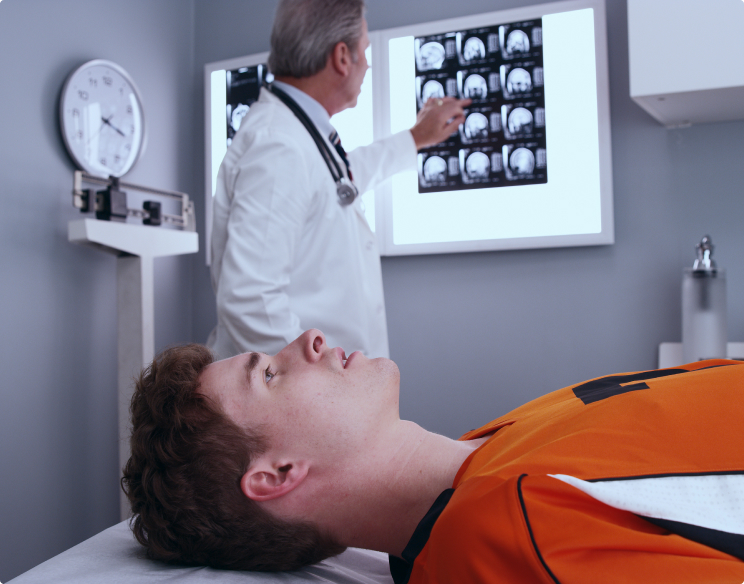Tough and compassionate in traumatic brain injury cases
We have worked with countless clients who have suffered catastrophic injuries, including traumatic brain injuries, or TBIs.
These injuries cause serious brain damage affecting a person’s personality, social skills, motor skills, and decision-making ability.
A TBI doesn’t just affect the victim, but their family as well. If you or a loved one sustained a traumatic brain injury, you may be able to seek compensation for injuries and medical expenses.
You may be able to recover compensation for:
- Lost wages
- Loss of enjoyment of life
- Medical expenses
- Lost future wages
- Future medical costs
- Pain and suffering
- Mental anguish
- Mental impairment
- Permanent disability
- Loss of earning capacity
- Property damage
In a traumatic brain injury claim, establishing negligence requires the injured party to demonstrate that the other party involved in the accident was at fault or acted negligently, resulting in the brain injury.
Your top priority should be focusing on your recovery and following your doctor’s instructions. In case you require compensation or encounter insurance-related challenges, rely on the guidance and support of your traumatic brain injury lawyer and their dedicated team to assist you and your family through these difficulties.

For a free legal consultation with a traumatic brain injury lawyer serving North Carolina, call (877) 333-1000
Since TBIs are caused by a blow to the head, they can occur in a variety of situations.
Over 40 percent of TBIs are caused by falls. Additionally, 15.5 percent are caused by blunt force trauma, 14.3 percent by automobile accidents, and 10.7 percent by assaults. As brain injury attorneys, we often see TBI victims injured by:
-
Truck accidents
-
Explosions
-
Premises liability (slip-and-fall)
-
Sporting accidents
-
Car accidents
-
Construction accidents
-
Defective products (product liability)
-
Motorcycle accidents
-
Domestic Violence
-
Workplace Injuries
It’s possible to sustain a traumatic brain injury without being diagnosed by a doctor.
Often, the only way to detect a mild TBI is by monitoring the victim in the days and weeks after the accident.
If you think you or a loved one may be suffering from a TBI, look out for warning signs. If any of these symptoms develop, call your doctor or go to an emergency room immediately:
-
Persistent headaches or migraines
-
Loss of consciousness
-
Vomiting/nausea
-
Trouble falling asleep
-
Extreme drowsiness or problems waking up
-
Ringing in ears
-
Dizziness or disorientation
-
Anxiety/depression
-
Confusion
-
Difficulty concentrating
-
Mood swings
-
Memory loss
-
Seizures
-
Numbness or tingling in limbs or digits
-
Slurred speech
-
Problems tasting or smelling
-
Blurred vision/pupil dilation
-
Loss of bladder control
If a child experiences a TBI, it may be harder for them to explain their symptoms or how they feel.
Adults should look for the following symptoms in children who may have a TBI:
- Crying more than usual
- Moodiness or irritability
- Changes in eating habits
- Difficulty concentrating
- Changes in sleeping habits
- Loss of interest in toys or activities
- Sadness/depression

North Carolina Traumatic Brain Injury Lawyer Near Me (877) 333-1000
Many brain injuries are the result of bruising, bleeding, twisting, or tearing of the brain tissue.
TBIs are classified as either open injuries or closed injuries, depending on how the injury occurred.
Open TBIs are also called open head injuries (OHIs) and may be visible to the naked eye. They happen when the head comes into direct contact with another object, often as a result of a fall, an attack, or blunt force trauma. An open TBI can leave pieces of bone, debris, or shrapnel embedded in the victim’s brain.
Closed TBIs, or closed head injuries (CHIs), are much more serious. These can occur even when the head is protected by an airbag or helmet. Because the skull is not fractured, the brain absorbs most of the impact. Victims of closed TBIs are much more likely to experience swelling or bleeding in the brain which can cause blood clots, coma, and death.

Once a TBI is classified as open or closed, a doctor can evaluate it based on how severe the damage and symptoms are.
The injury will be classified as either mild, moderate, or severe traumatic brain injury.
-
Mild TBI
Mild traumatic brain injuries may not show up on an MRI or CT scan. In many cases, unless the victim loses consciousness or notices a change in cognitive ability, a mild TBI may never be diagnosed.
-
Moderate TBI
Moderate traumatic brain injuries could have no permanent side effects, or they could be permanently disabling. For a moderate TBI, it depends on what caused the injury and how much force the brain had to endure. Common side effects include prolonged loss of consciousness and permanent or temporary physical, mental, and behavioral issues.
-
Severe TBI
Severe traumatic brain injuries cause long-term side effects or are fatal. Some of these side effects include permanent mental and behavioral issues and an increased risk for Alzheimer’s and Parkinson’s disease.
In cases where a severe or even mild traumatic brain injury leads to long-term or permanent disabilities, it is possible to face lifelong medical expenses.
Aside from the symptoms mentioned above, TBIs can cause irreversible or fatal health problems. Serious complications of traumatic brain injuries include:
In a coma, the victim is unconscious and unable to communicate. Some comas last a few days or weeks while others last the remainder of the victim’s life.
A TBI victim in a vegetative state may be able to open their eyes, move, or make noise. Victims may be in a vegetative state permanently or transition into a minimally conscious state.
Victims in a minimally conscious state will have an altered level of consciousness while remaining aware of their surroundings. Though this is a serious medical condition, recovery is possible.
Caused by a stroke, locked in syndrome leaves victims awake and aware but without the ability to move.
A TBI victim suffering from brain death will have no measurable brain activity.
This condition usually affects victims of multiple TBIs (football players, boxers, etc.). CTE can have severe side effects, like memory loss, impaired judgment, or a drastic change in personality or behavior. Currently the only way to diagnose CTE is through autopsy, though doctors and researchers are working on finding a better way.

Click to contact our North Carolina Personal Injury Lawyers today
At DeMayo Law Offices, we have built an excellent reputation within our community.
We serve victims of traumatic brain injury throughout North Carolina. Our experienced team of head injury legal professionals are available 24/7, so you never have to wait long for a callback. We have three conveniently located offices in Charlotte, Hickory, and Monroe.
Contact DeMayo Law Offices at (866) 205-5181 if you or a loved one has suffered losses due to a traumatic brain injury. We will provide you with a free initial consultation.


